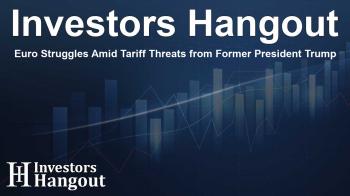Euro Struggles Amid Tariff Threats from Former President Trump

Currency Markets Respond to Tariff Threats
The euro recently experienced a notable decline against the US dollar after former U.S. President Donald Trump reignited trade tensions by suggesting a substantial 30% tariff on imports from the European Union. Such comments, made during a campaign event, stirred immediate reactions within the currency markets, intensifying uncertainties and dampening the sentiment among risk-sensitive assets.
In the early trading hours, the euro dropped by 0.4%, settling at 1.0850 against the dollar, marking a retreat from recent peaks. Investors are grappling with the implications of a revived U.S.-EU trade disagreement, as Trump's rhetoric particularly pointed toward European automobiles, luxury products, and agricultural goods, signaling an intention to "level the playing field" through stringent tariff enforcement.
Investor Concerns Over Protectionist Policies
Although markets have adjusted to the often politically charged environment, Trump's statement has raised fresh investor anxieties regarding a return to the protectionist policies that characterized his previous presidential term. The potential for a 30% tariff could escalate tensions dramatically between the U.S. and EU, affecting trade worth hundreds of billions.
Economists warn that such tariffs would likely provoke retaliatory strategies from Brussels, reigniting a trade dispute that could dampen investor sentiment. This escalation could disrupt export flows, further complicating the fragile recovery already evident among several EU economies.
"The ramifications of a trade war with the U.S. would be extensive," noted one foreign exchange analyst. "Not only would it negatively impact the euro, but it could also hinder planning at the European Central Bank, already balancing inflation control with growth support."
Economic Data Compounds Euro Weakness
Further compounding the euro's challenges is the recent economic data from Europe, which has done little to aid its position. Recent statistics indicate that manufacturing activity in Germany continues to struggle, suffering from a decrease in export orders due to waning global demand. Additionally, eurozone inflation has slightly subsided but remains above target, complicating the European Central Bank's policy decisions.
Market participants are keeping a close eye on forthcoming eurozone inflation assessments and GDP forecasts to determine whether the ECB might alter its stance or adopt a more dovish strategy in response to these unfavorable conditions. Any signal toward easing monetary policies could further depreciate the euro, especially in light of a resilient U.S. economy which allows the Federal Reserve the flexibility to sustain higher interest rates.
Dollar Strength Plays a Critical Role
The strength of the U.S. dollar has been another critical factor in the euro's recent decline. As traders increasingly foresee a prolonged period of high interest rates from the Fed, renewed interest in the dollar has emerged. This divergence in fiscal policy outlooks between the ECB and Fed has broadened the yield disparity, favoring U.S. dollar-denominated investments.
In the short run, the EUR/USD pairing is poised to respond sensitively to geopolitical developments, central bank communications, and broader market dynamics. Should Trump maintain an aggressive trading posture throughout his campaign, analysts predict that the euro could continue to face significant challenges.
Navigating Volatility: The Euro’s Future Outlook
As investors contend with this wave of renewed political risks, the euro is set for a turbulent path ahead. Even though the European economy has demonstrated resilience, it remains susceptible to external shocks—especially those linked to global trade. Trumps' tariff threats have returned to the forefront of market conversation, amplifying the uncertainties that traders now face.
Observers in the market are advised to remain vigilant in the following weeks, recognizing that further statements from Trump or EU representatives may quickly influence market sentiment. Until there is clarity regarding actual policy directions, traders may lean towards safer investments, reducing exposure to euro-related assets.
As it stands, the euro's gradual descent reflects increasing investor disquiet amid the intersection of electoral politics and global trade frictions, casting a shadow over an already precarious macroeconomic situation.
Frequently Asked Questions
What caused the recent drop in the euro's value?
The euro weakened primarily due to former President Trump's threats of imposing significant tariffs on European imports, stirring uncertainties in the currency markets.
How are traders responding to Trump's tariff threats?
Traders are shifting towards safe-haven assets like the US dollar, leading to increased demand and contributing to the euro's decline.
What economic indicators are affecting the euro's position?
Manufacturing activity in Germany and eurozone inflation rates are critical indicators influencing the euro’s current market performance.
What is the outlook for the euro in light of political risks?
The euro is expected to remain volatile amid ongoing political risks and potential retaliatory trade measures from the EU.
How is the U.S. economy affecting the euro's value?
The resilience of the U.S. economy, combined with a higher interest rate outlook from the Federal Reserve, creates a disparity that disadvantages the euro.
About The Author
Contact Riley Hayes privately here. Or send an email with ATTN: Riley Hayes as the subject to contact@investorshangout.com.
About Investors Hangout
Investors Hangout is a leading online stock forum for financial discussion and learning, offering a wide range of free tools and resources. It draws in traders of all levels, who exchange market knowledge, investigate trading tactics, and keep an eye on industry developments in real time. Featuring financial articles, stock message boards, quotes, charts, company profiles, and live news updates. Through cooperative learning and a wealth of informational resources, it helps users from novices creating their first portfolios to experts honing their techniques. Join Investors Hangout today: https://investorshangout.com/
The content of this article is based on factual, publicly available information and does not represent legal, financial, or investment advice. Investors Hangout does not offer financial advice, and the author is not a licensed financial advisor. Consult a qualified advisor before making any financial or investment decisions based on this article. This article should not be considered advice to purchase, sell, or hold any securities or other investments. If any of the material provided here is inaccurate, please contact us for corrections.

